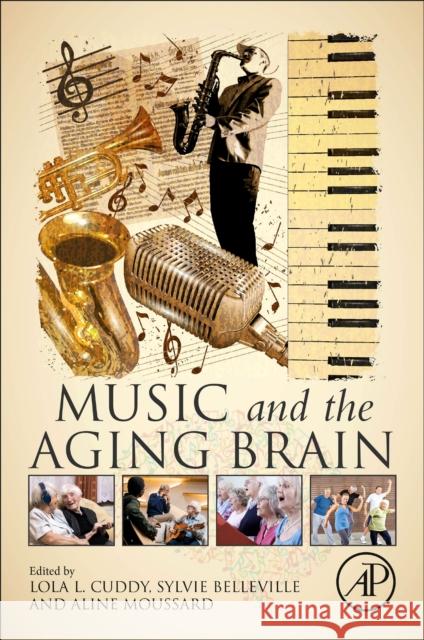Music and the Aging Brain » książka



Music and the Aging Brain
ISBN-13: 9780128174227 / Angielski / Miękka / 2020 / 425 str.
Music and the Aging Brain
ISBN-13: 9780128174227 / Angielski / Miękka / 2020 / 425 str.
(netto: 547,05 VAT: 5%)
Najniższa cena z 30 dni: 570,87
ok. 16-18 dni roboczych.
Darmowa dostawa!
"Bringing together numerous experts, the book presents thoroughly what we currently know about music in the aging brain: From fundamental research on basic functioning and potential disorders in the elderly to applied research on music's boosting power in normal and pathological aging. A complete approach." --Barbara Tillmann, CNRS Research Director, Lyon Neuroscience Research Center, France
"Recent years have seen a great deal of progress in understanding both the mental processes associated with aging, and those related to music. Cuddy, Belleville, and Moussard are top experts in the domains of aging, music, and neurocognition. By applying careful scientific analysis and detailed review, their new edited volume promises to shed light on the intersection of these complex fields that offer both hope and controversy." --Robert J. Zatorre, Montreal Neurological Institute, McGill University, Montréal, Québec, Canada
"We hear many stories about "the healing power of music." Is there something to them? It's nice to imagine that such a pleasurable pastime can be neuroprotective and immune-protective.well, where's the evidence? Music and the Aging Brain is the book I wish I had written-and it's far better than anything I could have done. Cuddy, et al. bring together the top scientists in the world to tell us the state-of-the-art in music and aging research. There is much to be optimistic about. This book will stand as the bible for music and aging research and interventions for many, many years to come." --Daniel J. Levitin, James McGill Professor of Neuroscience and Music (Emeritus), McGill University; author of This Is Your Brain on Music and Successful Aging
1. The musical brain
Part 1 Effects of Aging on Music Processing 2. Processing of musical pitch, time, and emotion in older adults 3. Age-related hearing loss
Part 2 Disorders of Musical Perception and Memory 4. Disorders of music processing in dementia 5. Stroke and acquired amusia 6. "Curious cases of preservation of music compositional ability in the presence of organic brain disease: historical examples
Part 3 The Power of Music as Neuroprotection in Normal Aging 7. Theories of cognitive aging: a look at potential benefits of music training on the aging brain 8. Training-induced cognitive and neural changes in musicians: implications for health aging 9. Singing and choirs 10. Effects on cognition of physical activity with or without music and of dance 11. Toward music-based auditory rehabilitation for older adults
Part 4 The Power of Music in Rehabilitation and Care in Disorderd Aging 12. Benefits and limits of musical interventions in pathological aging 13. Why do music-based interventions benefit persons with neurodegenerative disease? 14. Neurorehabilitation in aging through neurologic music therapy 15. The use of rhythm in rehabilitation for patients with movement disorders 16. The impact of music interventions on motor rehabilitation following stroke in elderly
Lola Cuddy is Full Professor Emerita in the Department of Psychology, Queen's University, where she founded and directed the Music Cognition Laboratory. Research interests include the perceptual, cognitive, and emotional processes involved in music appreciation and understanding. Recent work has focused on individual differences in musical and prosodic skills and sensitivities, and such topics as absolute pitch, tone deafness, effects of music lessons on nonmusical cognitive skills, musical dyslexia, aging and music, amusia following stroke, and sparing of musical memories in Alzheimer's Disease. She was editor of the flagship journal Music Perception (2002-2017) and is a current associate editor of Cognitive Processing. Sylvie Belleville is Full professor at the Psychology Department of University of Montreal and Director of the Research Center of the Institut Universitaire de Gériatrie de Montréal. She is recognized for her work on the use of cognitive training to prevent age-related cognitive decline. She identified processes of compensation and plasticity in mild cognitive impairment using brain imaging techniques and also contributed to a better understanding of the neuropsychological deficits found in persons with very early signs of Alzheimer's disease or mild cognitive impairment. She published more than 200 peer-reviewed articles and holds a Tier 1 Canada Research Chair on the Cognitive Neuroscience of Aging and Brain Plasticity. Aline Moussard is a neuropsychologist specialized in applied research related to the use of music as a tool for cognitive stimulation in healthy and clinical populations. She is also a project manager at the Research Center of the Institut Universitaire de Gériatrie de Montréal, and is currently coordinating a multisite research project on dementia prevention that uses cognitive training and stimulating leisure activities (including music practice) to build and strengthen cognitive reserve in healthy older adults.
1997-2026 DolnySlask.com Agencja Internetowa
KrainaKsiazek.PL - Księgarnia Internetowa









